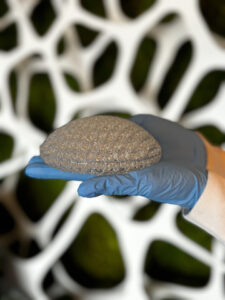CollPlant Biotechnologies and OEM 3D printer manufacturer Stratasys Ltd. have initiated a pre-clinical study with 200cc commercial-sized regenerative implants produced with the Stratasys Origin® printer.

Both companies have been working together since last year. They aim to develop a solution to bio-fabricate human tissues and organs using Stratasys’ P3 technology-based bioprinter and CollPlant’s rh-Collagen-based bio inks.
CollPlant Biotechnologies is a regenerative and aesthetic medicine company that harnesses 3D bioprinting for tissue regeneration and organ manufacturing. Before working with Stratasys, CollPlant collaborated with 3D Systems on a similar topic. No information has been shared on how their project advances so far. The work with Stratasys seems to be the most advanced research in the field.
Stratasys printers use Programmable Photopolymerisation (P3) technology for 3D bioprinting regenerative soft tissue matrix. This bio-printing solution will be used as a test to gauge the ability of the breast implants to promote the growth of natural breast tissue and then degrade slowly.
If successful in regenerating a person’s natural breast tissue without an immune response, the breast implants could make a difference. The market for aesthetic and reconstructive procedures could undergo a radical change. The rhCollagen-based regenerative implants can improve patient outcomes by overcoming the issues associated with silicone implants or autologous fat transfer.
“[…] We believe that our rhCollagen-based regenerative implant has the potential to overcome the challenges of existing breast procedures that use silicone implants or autologous fat transfer, thereby significantly improving patient outcomes,” Yehiel Tal, CEO of CollPlant, commented.
This preclinical study attempts to print commercial-size implants with high resolution and optimal physical properties. Initial results from the study are expected in early 2025. A press communication from Stratasys states that earlier this year, CollPlant announced additional positive data from its previous pre-clinical studies that are currently underway which showed evidence of well-developed connective tissue containing blood vessels (i.e., neovascularization) within the implant.
Progressing tissue ingrowth inside the implant was also observed confirming tissue regeneration. An initial biodegradation process was noticed, while the original structure of the 3D breast implant was preserved. No adverse tissue reaction was present, confirming the safety profile of this novel implant in development.
It is important to study the efficacy of the implant in stimulating the formation of native breast tissue and gradual degradation. Success with the pre-clinical study would offer patients a regenerative solution to traditional implants that could shorten their healing process.
Author: Nagarjun M
Remember, you can post free-of-charge job opportunities in the AM Industry on 3D ADEPT Media or look for a job via our job board. Make sure to follow us on our social networks and subscribe to our weekly newsletter: Facebook, Twitter, LinkedIn & Instagram! If you want to be featured in the next issue of our digital magazine or if you hear a story that needs to be heard, make sure to send it to contact@3dadept.com.





